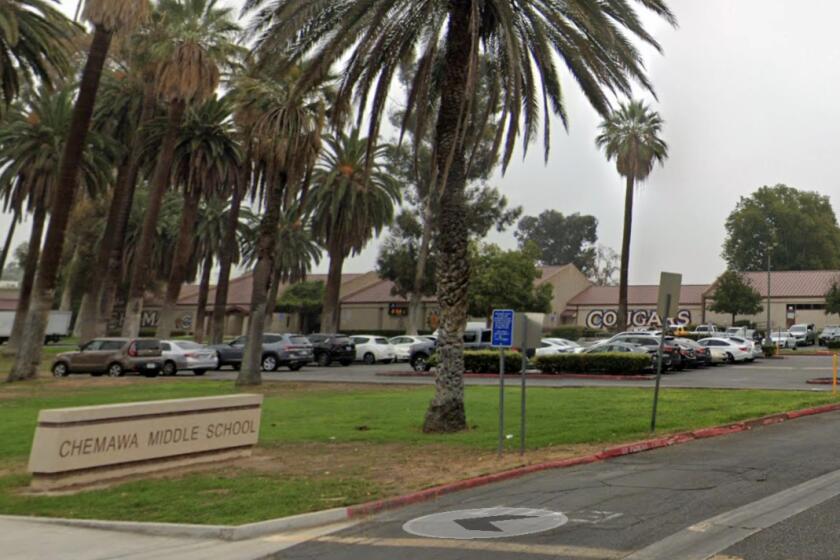South L.A.’s Nevin Avenue Elementary gives magic a chance
Anahi Escamilla is the 11-year-old daughter of a garment worker. She lives in Historic South-Central Los Angeles. And she believes in the power of magic.
Last week she climbed onto a stage with two dozen schoolmates and created a dazzling world of spells and fairies.
Dressed in Athenian robes, she played a young woman named Hermia, who crossed paths with a forest spirit named Puck, played by 9-year-old Salvador Medina.
Salvador, his face painted green, ended the show with a speech that brought 100 grown-ups to their feet, including a large dad in a Chivas de Guadalajara jersey in the second row and a lot of other parents who’d never seen a play in English before.
Afterward, Anahi explained to me what Shakespeare’s “A Midsummer Night’s Dream” is all about.
“The message of the play is to show the magic that lies beyond, to show that impossible things can happen,” she said. “If you want something, such as love, you have to fight for it.”
In the not too distant past, Nevin Avenue Elementary was sadly bereft of magic. The school was surrounded by mounds of refuse. Freelance recyclers, among the poorest of the city’s poor, gathered on adjacent lots to sort through trash. And the classrooms were in such bad shape, the state took over the campus.
“Our kids literally had to wade through garbage to get to class,” said Kevin Baker, a former principal appointed to the school in 2006.
Baker and the community pestered the city to clean things up. Now the trash is gone. Test scores in math and English are way up. And the kids are memorizing Shakespearean insults such as: “You juggler! You canker-blossom! You thief of love!”
Teachers, parents, artists and administrators fought together for a school where children would take on challenges as big as Shakespeare, and work hard to learn the meaning of lines such as those spoken by fifth-grader Christian Corona: “The lunatic, the lover and the poet are of imagination all compact.”
“We had a vision that our kids would be saying these words,” said teacher Rhonda Siveraman.
Some people think we can bring back our public schools with a steady recipe of standardized tests, state mandates and healthy budgets. Over at Nevin Avenue Elementary, they’ve placed their faith not just in those things but in great art, street savvy and open doors.
The school serves one of L.A.’s poorest neighborhoods, a community of old apartment buildings set amid factories and warehouses. Many residents work in the nearby Garment District, and Spanish is the first language of the streets.
It’s the kind of L.A. neighborhood where, generally speaking, the parents don’t get involved in their children’s education.
But at Nevin, parent volunteers worked to bring “A Midsummer Night’s Dream” to the stage. They helped build the sets, including a forest of construction-paper trees and crepe-paper vines.
School moms made the costumes, too. They transformed hangers, pantyhose and glitter into fairy wings, and even ripped up an old quinceañera dress for its fabric.
“I made wings and part of the set, but I never expected the show would be this big,” said Maria Rodriguez, a 48-year-old tamale vendor from Michoacan, Mexico, whose own education was so limited, she told me, “I can barely write my own name.”
How did administrators get parents such as Rodriguez to come to school? For starters, they didn’t just wait for them to show up. They knew that L.A.’s cultural barriers don’t fall unless you push them.
“A lot of Spanish-speaking parents are intimidated,” said Emma Rodriguez, a retired school administrator who helps out at Nevin as a consultant. “So you have to invite them and make them feel welcome.”
Monica Toro, a mother of two Nevin students, told me that parents felt shut out before the new administrators arrived.
“The gates were always locked,” she said. “We would go inside and they would tell us we didn’t belong there.”
Last Friday, Toro puttered around a classroom, applying makeup to several student-actors just before the opening curtain.
Nearby, director Jeanette Horn, a 30-year veteran of the stage and theater education, led the students through one last round of vocal exercises. Two dozen kids, a few of them newly minted English speakers, repeated in unison: “The lips, the teeth, the tip of the tongue!”
Then Horn called across the room to Salvador Medina. “Puck! Give me a line!”
“What fools these mortals be!” he yelled back.
Watching this little theater troupe, and hearing the story of their school, I understood a simple truth that often gets lost in the debate over public education: It takes many kinds of people with very different skills to lift up a school.
At Nevin, they’ve got hardworking teachers, veteran administrators, committed parents and experienced artists.
Baker guided the school out of receivership and handed it over to a new principal, Denise Pratt, his former assistant. Pratt hired Horn to form the school’s “Shakespearites” program. Horn rounded up volunteers, including veteran thespian Alison Korman and a group of USC theater students.
On opening night, all the children hit their cues and no one forgot a line. (Horn had condensed Shakespeare’s five acts into a kid-friendly 45 minutes.)
After the final curtain, Anahi Escamilla all but insisted that I interview her. Just like Hermia, she’s strong and bold.
“She’s peaceful when things go right,” Anahi said of her character. “But when something goes wrong, she gets her attitude out.”
Her mother and father beamed nearby. They’re from Michoacan, and their own educations stopped after grade school. Now their daughter is a straight-A student, a confident actress and fifth-grade president.
Anahi doesn’t know where she’ll go to junior high next year. She lost out in a magnet-school lottery.
Nevin Avenue Elementary is in a similar spot. It’s full of promise, but with an uncertain road ahead.
Although I can’t say what the future holds, I heard hope in the way Salvador nailed his closing lines last week. He’d been practicing them, he told me, for months.
As he opened his arms downstage and declared, “So, good night unto you all,” his parents were in the front row. Behind them stood the tamale vendor who built the sets, and Puck’s teacher and his director, and the women who sewed his costume. They were all very proud.
More to Read
Sign up for Essential California
The most important California stories and recommendations in your inbox every morning.
You may occasionally receive promotional content from the Los Angeles Times.











